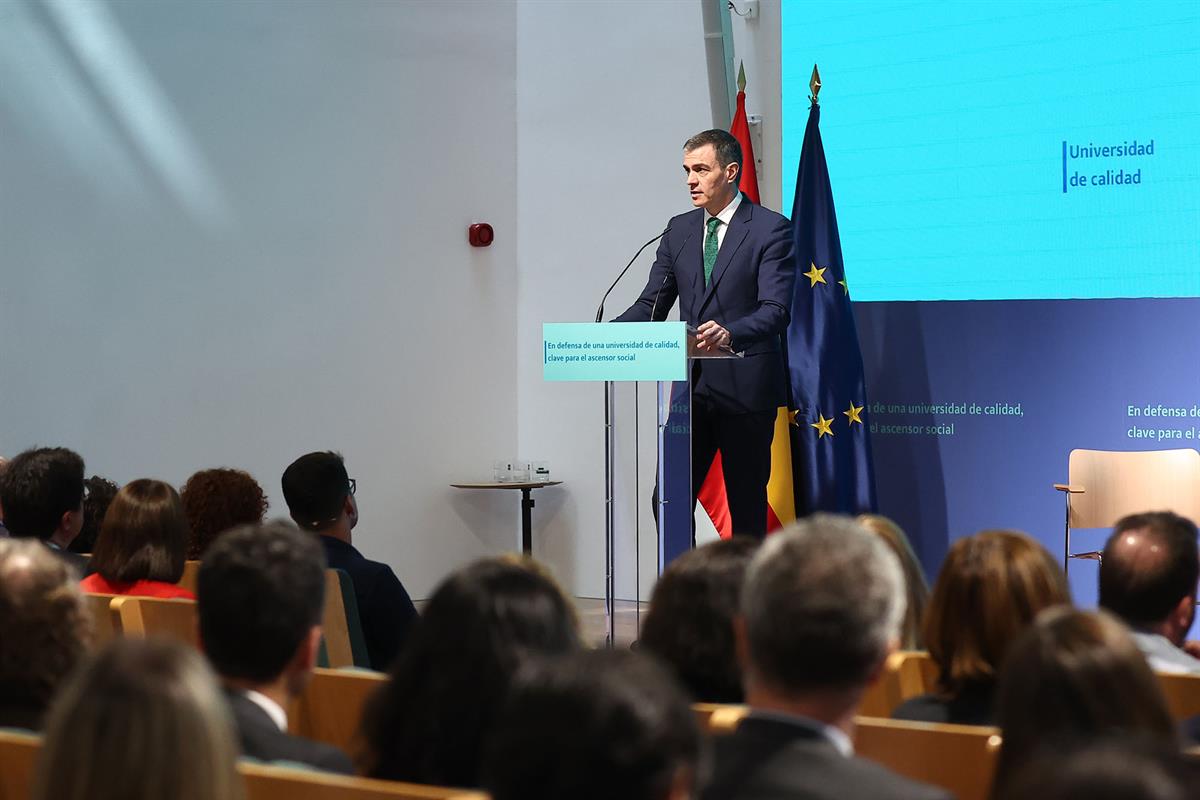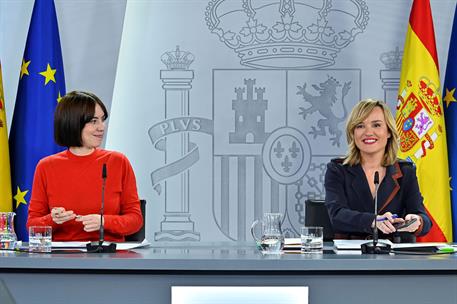Pedro Sánchez assures that the Government will defend the quality, fairness and prestige of the Spanish university system
President's News - 2025.3.31
Pious Schools of the UNED, Madrid
 The President of the Government of Spain, Pedro Sánchez, accompanied by the Minister for Science, Innovation and Universities, Diana Morant, speaks with the rector of the UNED, Ricardo Mairal (Pool Moncloa / Jose Manuel Álvarez)
The President of the Government of Spain, Pedro Sánchez, accompanied by the Minister for Science, Innovation and Universities, Diana Morant, speaks with the rector of the UNED, Ricardo Mairal (Pool Moncloa / Jose Manuel Álvarez)
Pedro Sánchez stressed that the Executive "is going to fight to defend the Spanish university system." "We will defend its quality, equity and prestige. And, of course, we are going to break a lance in favour of the public sector, without detracting from those private institutions that do work well, with rigour and quality."
He said this during the event 'In defence of quality universities, key to the social lift', at the Escuelas Pías headquarters of the UNED, in Madrid, where he announced two important measures that the Government will adopt in the coming days.
Firstly, "a Plan to Relaunch the UNED", with 30 million euros for the first year, which represents a 35% increase in the Government's contribution. The aim, he explained, is to make the UNED "the benchmark university in Spain in public and quality virtual education" and to turn it into "a modern, accessible and prestigious institution that leads the digital transformation of the university system without renouncing the values of the public university: equality, excellence and a vocation for service."
To this end, the Executive will act on three fronts: it will renew its digital capacities with cutting-edge technology; it will increase the number of places on qualifying bachelor's and master's degrees, such as the Master's in Teacher Training or General Health Psychology by 5,000; and it will create 2,000 new places linked to bachelor's and master's degrees in high-demand degrees, such as Education or Communication, as well as new degrees such as the Bachelor's in Artificial Intelligence, Neurosciences or Computational Neutronics.
A university cannot be a factory of degrees without guarantees
 The President of the Government of Spain, Pedro Sánchez, the Minister for Science, Innovation and Universities, Diana Morant, and the Minister for Digital Transformation and Public Funciton, Óscar López, during the event | Pool Moncloa/Fernando Calvo
The President of the Government of Spain, Pedro Sánchez, the Minister for Science, Innovation and Universities, Diana Morant, and the Minister for Digital Transformation and Public Funciton, Óscar López, during the event | Pool Moncloa/Fernando Calvo
The second measure announced by the president is that tomorrow the Government will take the tightening of the criteria for the creation, recognition and authorisation of universities and university centres to the Council of Ministers, for urgent processing, because "a university cannot be a vending machine", nor "a factory of degrees without guarantees".
"We are going to pursue practices that undermine the prestige of our universities, both public and private, so that they meet our quality standards and ensure the excellence of the professionals who look after us and defend us," said the president, who explained that this will be done in three ways.
Firstly, requirements will be strengthened to ensure that universities are quality projects. Therefore, in addition to the report of the General Conference on University Policy, there will be a mandatory evaluation report drawn up by ANECA or the equivalent regional agencies. A report that is binding in the process of setting up new universities, thereby ensuring rigorous and independent control. Secondly, "we will tighten the opening criteria" and "a minimum critical mass of 4,500 students will be required in the first five years of operation", and they will have to assume the "commitment to have at least 10% of university accommodation available to facilitate access to housing." In addition, university management experience will be required of their promoters, and they will have stricter research requirements to ensure a real commitment to knowledge generation. Thirdly, the Executive will propose that online universities should be considered national in scope, because their scope of academic activity is in practice the whole of Spain. "Therefore, they can only be authorised with the approval of Parliament, in order to strengthen oversight and guarantee their academic quality for the benefit of students throughout the country," he said.
"I know we must do much more to protect and strengthen our university system. All administrations with competences in this area should do so," he said. "But faced with the inaction of some or the irresponsible or deliberate management of others, there is no doubt that the Government of Spain will act", because "the stakes are high" and "it is time to choose between a model of universal, quality higher education that provides opportunities for those who need them and brings cohesion to the territory, or a model that discriminates between those who can pay and those who cannot" and "that wants universities to be meeting places where innovation and knowledge that enriches us all can emerge, not short-term businesses that only benefit a few."
During his speech, the President of the Government of Spain assured that "the history of Spanish public universities" is a success story". "That was our country's great commitment: public universities that would underpin progress and social cohesion and open their doors wide to the whole of society", and which became a true "social lift".
He also recalled that today "we are the seventh country in the European Union with the best educated young people" and "we are the third country in the European Union with the highest number of people enrolled in higher education."
Our university system is at risk
 The President of the Government of Spain, Pedro Sánchez, during his speech at an event in support of public universities | Pool Moncloa/Fernando Calvo
The President of the Government of Spain, Pedro Sánchez, during his speech at an event in support of public universities | Pool Moncloa/Fernando Calvo
However, Pedro Sánchez has warned that our public university system "is at clear risk" and "a model of higher education in which universal access and the guarantee of quality and excellence are deliberately threatened" is at risk. And it is "because of the will of those who want to fragment and privatise our universities" and "are prepared to ensure that equal opportunities are no longer guaranteed," he added. In his opinion, the formula is the same as the one they use for public health: weaken and question it, and then privatise. "First they cut resources, to undermine their functioning, and then their service and quality is questioned, precisely because of the resources that are taken away. And finally, when the deterioration is evident, they present privatisation as the only way out," he said.
The head of the Executive warned that this process "is already underway". "Here in Madrid, the regional government has cut funding for public universities by almost 30% since 2016, and in Andalusia, the university budget has been completely frozen for six years." This leads to a "decline in the quality of the system" and is "the logical consequence of prioritising tax gifts to those who have the most and cutting services for all."
Furthermore, Pedro Sánchez pointed out that "while public universities are being suffocated in terms of funding, a red carpet is being rolled out for the creation of new centres to turn them into "educational chiringuitos", which also discredits the magnificent private universities that we have in our country, and which are an international benchmark. Ultimately, he said, "universities cannot be a factory of degrees without guarantees. What is at stake is not only education, but the confidence of a whole society in its professionals and its institutions."
Finally, the president called on citizens "to mobilise in defending the public sector and equal opportunities. Defending a university system that unites and ennobles us as a society and as a country and which allows us to set in motion, once and for all in our history, the social mobility lift. It is up to all of us to make sure that this lift never stops again," he concluded.
Non official translation





